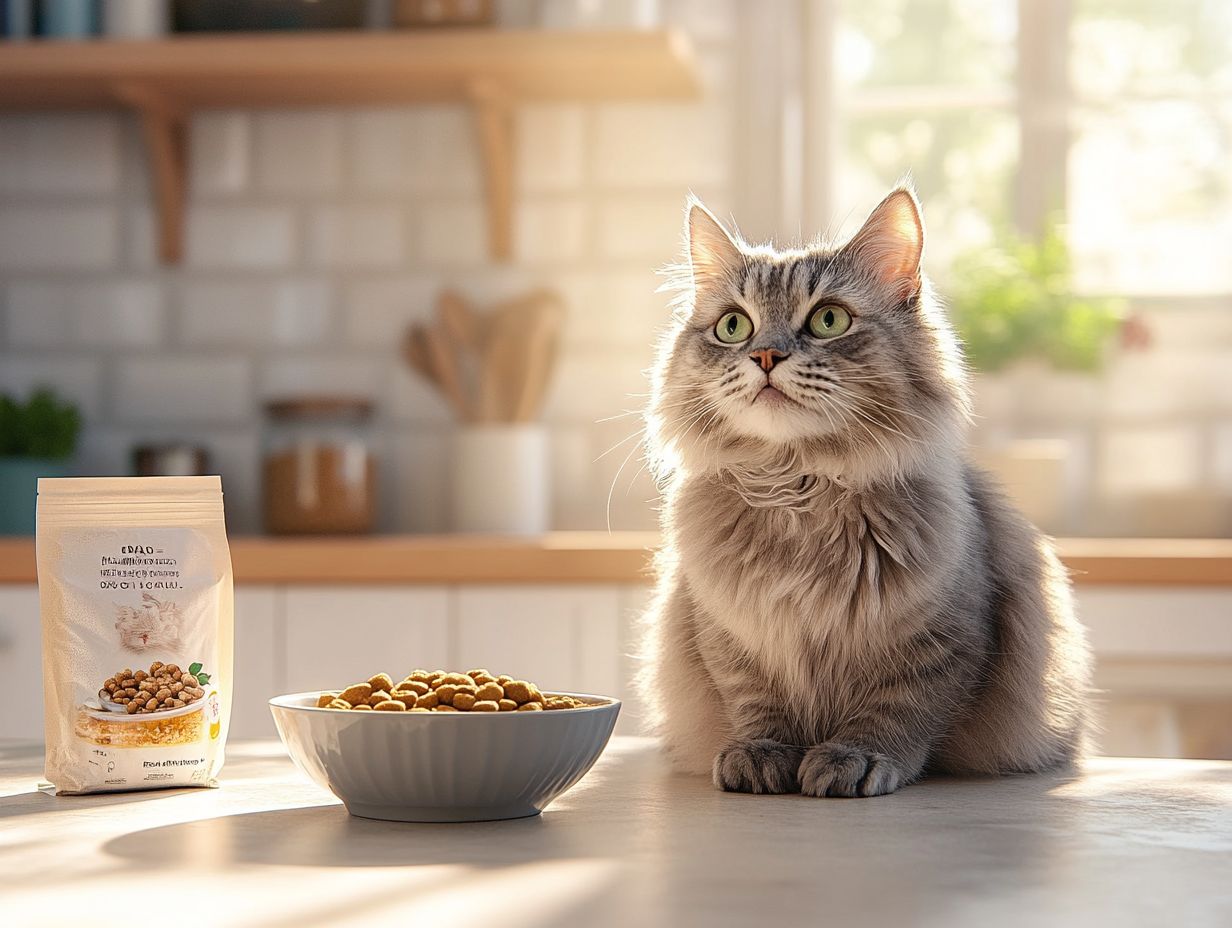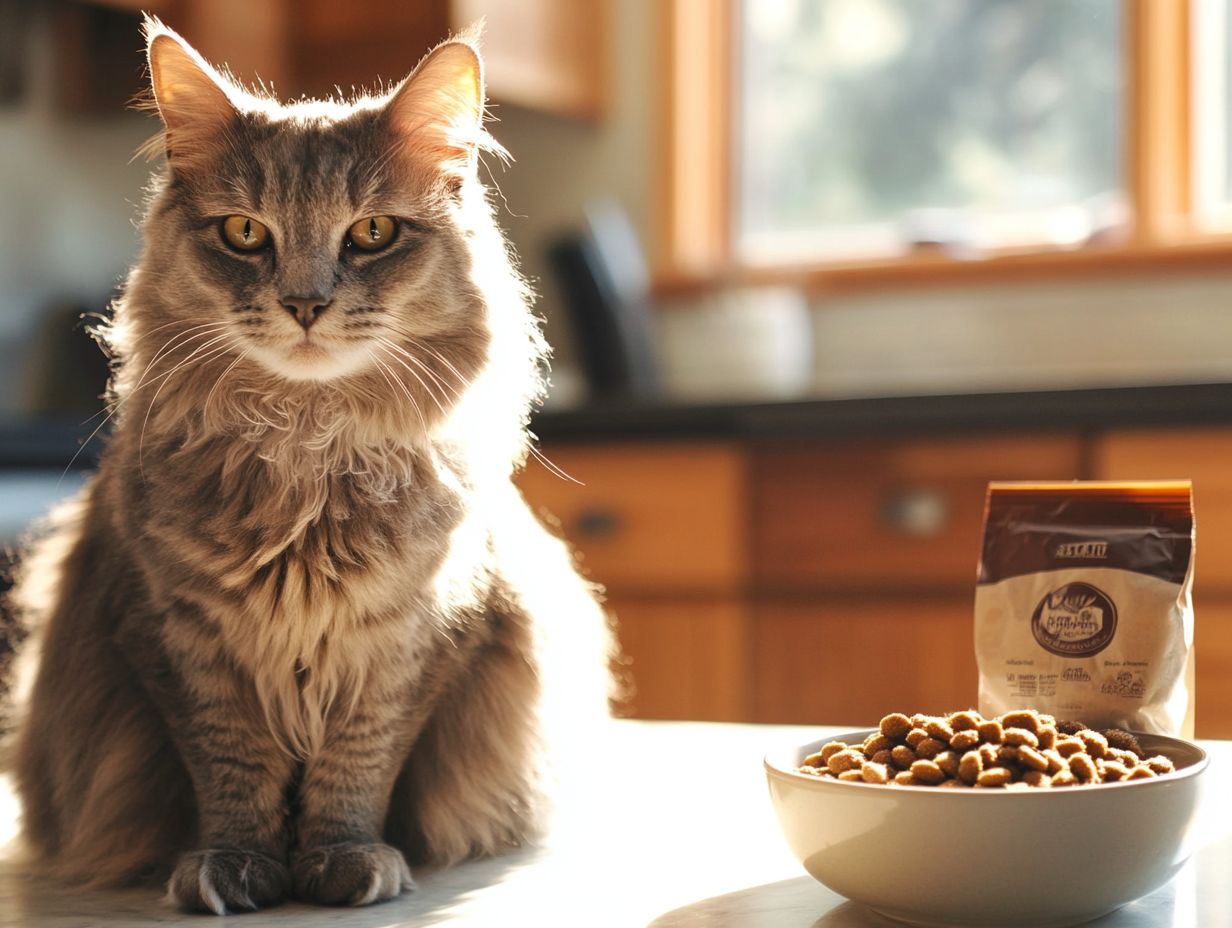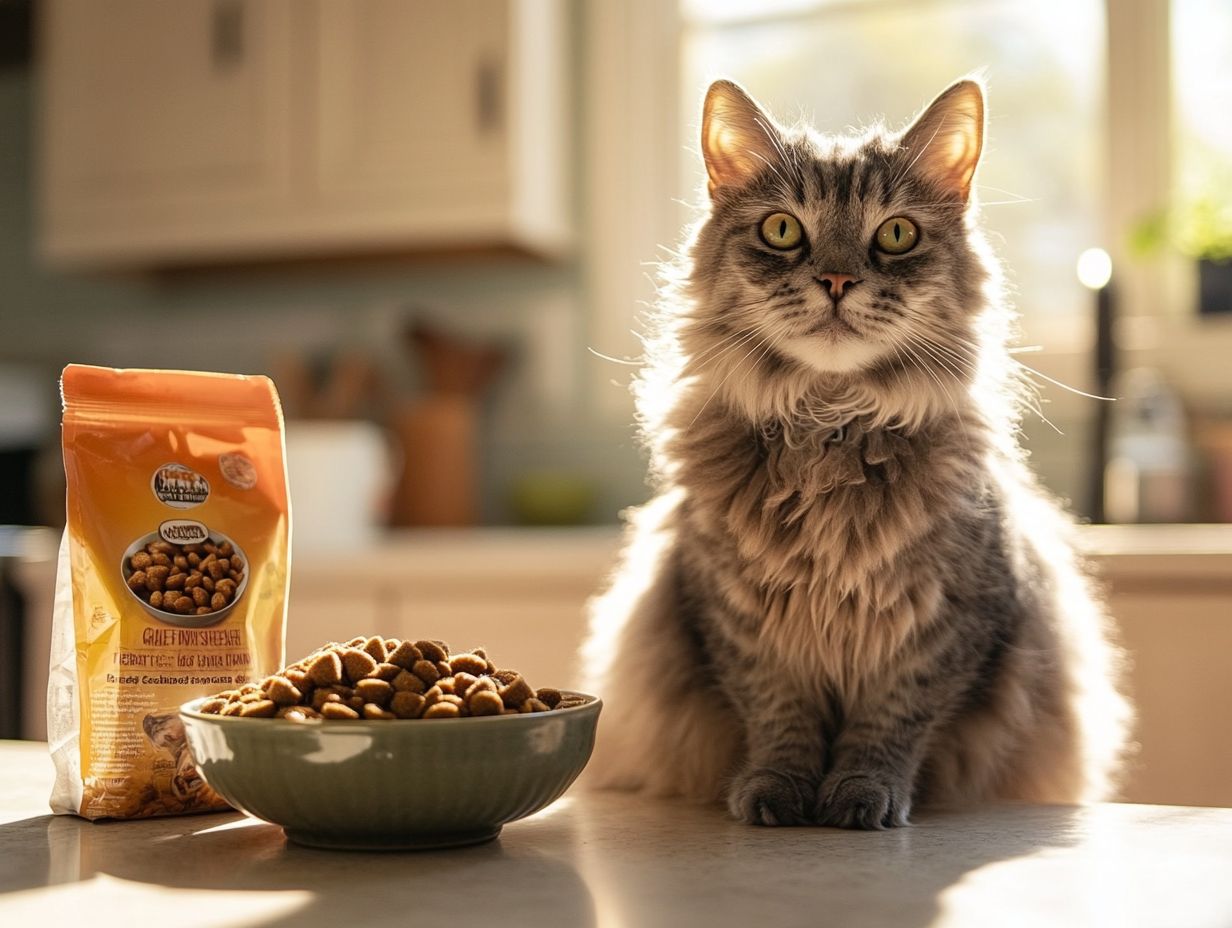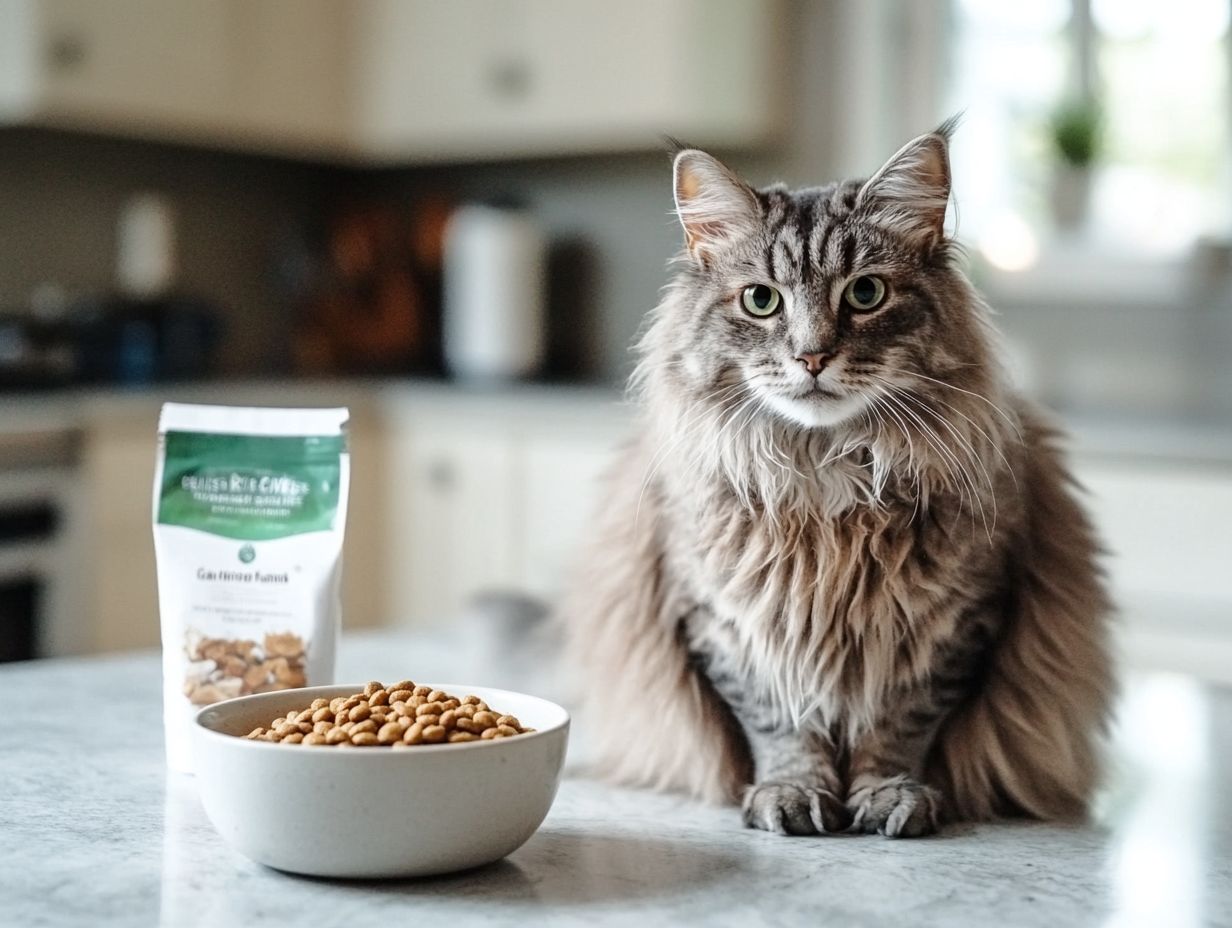As our furry companions age, their needs change. Understanding how to care for senior cats involves recognizing their health needs and incorporating tailored nutrition.
This article explores what defines a senior cat, the age at which they enter this stage, and the signs of aging to watch for, including tailored diets and weight management strategies.
It also discusses the importance of proper nutrition tailored to senior cats, focusing on high-quality animal proteins, healthy fats, and essential vitamins and minerals that support their health and digestive needs.
From food recommendations to tips for portion control and consulting with a veterinarian during dietary transitions, it covers everything you need to ensure your aging feline thrives.
Key Takeaways:

What is a Senior Cat?
A senior cat is generally defined as a feline that has reached an age at which its health needs may start to change, typically around 7 years or older. This stage of life presents unique challenges and considerations that can significantly affect their overall well-being.
Senior cats often require tailored nutrition and specialized diets to address their evolving needs, helping them maintain a healthy weight and optimal gut health. It is crucial to provide high-quality ingredients that meet AAFCO guidelines for their dietary management during this phase, as this directly impacts their quality of life. Be cautious of diets lacking sufficient animal proteins; poorly formulated homemade or raw diets can pose serious health risks for senior cats. For more information, check out Senior Cat Care: Grain-Inclusive Food Options for Aging Felines.
What Age is Considered Senior for Cats?
A cat is considered a senior when it reaches 7 years of age, although this can vary based on individual health and breed factors. For instance, larger breeds tend to age more quickly than smaller breeds and may exhibit signs of seniority as early as 6 years old. Following a balanced meal plan that includes a variety of animal ingredients like chicken and salmon can support their health.
Lifestyle choices, such as diet, exercise, and regular veterinary care, significantly impact a cat’s overall health and lifespan. As cats age, they become more susceptible to age-related issues such as arthritis, dental diseases, and decreased kidney function, necessitating increased awareness of their nutritional needs and more frequent check-ups.
By understanding the milestone markers in a cat’s life, caregivers can better address their specific health requirements as they age, ultimately promoting a comfortable and happy life.
What Are the Signs of Aging in Cats?
The signs of aging in cats include decreased activity levels, weight fluctuations, and behavioral changes, all of which indicate evolving health needs. Decreased activity, weight loss or gain, and alterations in behavior are common indicators of aging in felines. Cognitive dysfunction or senility in cats may manifest as behavioral changes that reflect their difficulty in adapting to the challenges of aging. Offering nutrient-rich options and ensuring fresh water is always available can help manage these changes.
Additionally, changes in grooming habits can signal senility and may further impact the physical condition of an aging cat. Products with a soft texture and easy-to-eat food can make eating easier for them.
Finally, it’s important to monitor food storage and handling practices carefully to prevent spoilage and contamination, as senior cats may be more vulnerable to foodborne illnesses.
Older cats might exhibit various physical changes, such as graying fur, loss of muscle tone, and dental problems. As they age, many cats lose their ability to groom themselves effectively, which can lead to a decreased appetite, as they often experience a diminished sense of smell and taste. They may also struggle to chew and swallow harder kibble, resulting in reduced food intake or refusal to eat altogether. This is a natural aspect of the aging process. Incorporating unique textures in food and considering subscription plans for consistent delivery can help address these issues.
However, these signs can indicate new dietary needs and may necessitate the introduction of specialized senior cat food. Such food is typically more nutrient-dense, supporting the joint health of older cats. Brands like Raised Right and Open Farm offer options that adhere to AAFCO standards and focus on animal-source protein content and other health benefits. At this stage of life, regular veterinary care becomes increasingly important to address any underlying health issues and promote a longer, healthier life for aging companions.
Why is Proper Nutrition Important for Senior Cats?
Proper nutrition is essential for senior cats as it directly impacts their health, longevity, and quality of life by addressing specific age-related needs. This includes focusing on nutritional levels and environmental sustainability in their diet. As obligate carnivores, their primary source of nutrition should come from animal proteins.
As cats age, their metabolism, digestion, and nutrient requirements change, making a balanced diet rich in high-quality animal-source proteins vital. Nutritional deficiencies can lead to health problems, including obesity and digestive issues. Critical nutrients such as taurine, omega-3 fatty acids, and antioxidants play pivotal roles in disease prevention. Offering a proprietary system of feeding recommendations can help maintain balance.
Therefore, well-formulated meal plans that accommodate dietary restrictions and support overall well-being are crucial.
How Does Aging Affect a Cat’s Nutritional Needs?
As cats age, their diets must be adjusted to accommodate changes in metabolism, weight management, and gut health. This includes reducing calorie intake, increasing digestible nutrients, and incorporating foods that support gut health.
As a cat’s metabolism slows significantly with age, owners need to modify their pet’s caloric intake to prevent obesity and other health issues. The WSAVA and AAFCO provide guidelines on calculating appropriate caloric intake based on the cat’s weight and activity level. Consequently, senior cats should receive fewer calories per day than when they were younger.
However, this does not mean they should eat less food overall; rather, they should consume meals rich in animal-source proteins. These meals should consist of a balanced combination of proteins, fatty acids, vitamins, and other essential nutrients to help maintain a healthy weight and avoid obesity.
Additionally, as cats grow older, their digestive health often declines. To prevent or address this issue, owners should provide meals that are lower in calories yet easy to digest. Meals rich in high-quality proteins and fibers can enhance gut health and overall energy levels.
These considerations, including prioritizing their nutrient needs and moisture content, are crucial for owners when determining an appropriate diet for their senior cats.
What Are the Risks of Not Providing Proper Nutrition for Senior Cats?

Neglecting to provide proper nutrition for senior cats can lead to serious issues such as obesity, malnutrition, and compromised immune function, ultimately shortening their lifespan. As these pets age, they may become more vulnerable to conditions like diabetes, kidney disease, and dental problems, all of which can significantly affect their quality of life. Subscription service options, like those from JustFoodForCats, offer convenience and consistency.
Without a well-balanced diet tailored to their unique needs, the risk of developing these ailments increases, making it essential for caregivers to prioritize the nutritional requirements of their feline companions. Adopting a proactive approach to feeding can help maintain a healthy weight, support vital organ function, and enhance overall well-being. It is also important to consult with a veterinary nutritionist for tailored meal plans, especially when conditions like kidney disease or diabetes are present.
By selecting high-quality, age-appropriate food and consulting with a veterinarian, owners can ensure that their senior cats lead healthier, more fulfilling lives.
What to Look for in a Grain-Inclusive Food for Senior Cats?
When selecting grain-inclusive food for senior cats, it is essential to choose high-quality ingredients that meet their unique health requirements, including balanced nutrition, superior digestibility, and ethical sourcing. As obligate carnivores, cats require a diet rich in animal-source proteins.
What Ingredients Should Be Included?
When selecting food for senior cats, it is essential to look for key ingredients such as high-quality animal proteins, Omega-3 fatty acids, and probiotics. These components, found in combinations like chicken, turkey, fish, lamb, and salmon, collectively contribute to optimal health and digestive function, playing a crucial role in enhancing the overall well-being of older felines. According to AAFCO and WSAVA guidelines, a proper diet should prioritize these essential nutrients.
High-quality animal proteins provide essential amino acids that support muscle maintenance and vitality, which are vital for aging cats. Omega-3 fatty acids, found in sources like fish or flaxseed oil, promote healthy skin and a shiny coat, while also supporting joint health and mobility—a common concern for many senior pets.
Probiotics assist in maintaining a balanced gut microbiome, ensuring maximized nutrient absorption and promoting regular digestion. However, cat owners should be aware of potential carbohydrate-related issues or allergies that may arise from grain-inclusive diets. By ensuring these beneficial ingredients are included, cat owners can significantly bolster their companions’ health and improve their quality of life during their golden years.
What Ingredients Should Be Avoided?
When selecting food for senior cats, it is essential to avoid ingredients such as artificial additives, fillers, and low-quality animal by-products, as these can lead to health complications and hinder nutritional absorption.
Senior cats often have specific dietary restrictions that must be considered, especially for those with conditions like kidney disease or diabetes. Ingredients like corn and soy, commonly used as inexpensive fillers, can contribute to obesity and digestive issues, both of which pose additional risks to a senior cat’s health.
Furthermore, preservatives and artificial flavors can exacerbate existing health problems, such as allergies and sensitivities to certain food types. Caregivers should prioritize healthy protein sources and essential fats while being aware of the dangers posed by unhealthy ingredients, ensuring their pets receive optimal nutrition as they age.
Top Grain-Inclusive Food Options for Senior Cats
The best grain-inclusive foods for senior cats consist of brands that offer premium quality and nutrition specifically formulated to meet the unique health needs of older felines. Always consult with a veterinarian before making significant changes to your cat’s diet.
1. Brand A Grain-Inclusive Senior Cat Food
Brand A offers a grain-inclusive senior cat food that features high-quality ingredients, including real chicken and added Omega-3 fatty acids, providing complete nutrition for older cats. This formula is specifically designed to meet the essential dietary needs of senior cats, ensuring they receive the necessary amino acids, vitamins, and minerals.
Real chicken enhances the protein content, which is crucial for muscle maintenance, while also serving as an appealing protein source. Omega-3 fatty acids support joint health, aiding mobility and promoting cognitive function as cats age.
Additionally, the inclusion of easily digestible grains facilitates proper digestion and nutrient absorption, making this a nutritionally complete option that addresses the specific needs of senior cats, ultimately contributing to healthier, more active lives. Proper food storage is essential to prevent spoilage—store in a cool, dry place and check for signs of spoilage like unusual odors or discoloration.
2. Brand B Grain-Inclusive Senior Cat Food

Brand B’s grain-inclusive senior cat food boasts one of the most rigorous quality control processes in the pet food industry, specifically formulated to meet the dietary needs of senior cats. This brand places a strong emphasis on the quality of its ingredients, with facilities and suppliers regularly inspected to ensure safety and nutritional integrity.
The food contains whole grains, healthy proteins, and a balanced blend of vitamins and minerals, all tailored to support the unique needs of senior cats while promoting better digestion and overall well-being.
Additionally, the inclusion of omega fatty acids enhances joint mobility, and a variety of antioxidants bolsters the immune system, making this one of the top choices for senior felines.
Furthermore, this wholesome ingredient profile aids in weight management, providing these cats with the energy they need to thrive and enjoy their golden years. It’s essential to monitor their weight and adjust food intake as needed, following the latest feline obesity guidelines to maintain their health.
3. Brand C Grain-Inclusive Senior Cat Food
Brand C offers a grain-inclusive senior cat food that features high-quality proteins, specifically chicken and salmon, and probiotics to promote digestive health and overall vitality in older cats. This formula is specifically designed to meet the unique nutritional needs of senior felines and contains adequate protein levels, around 30%, essential for maintaining muscle mass as cats age.
By incorporating these animal-source proteins, Brand C enhances the food’s palatability while supplying omega fatty acids that support healthy skin and fur. Additionally, the inclusion of antioxidants helps bolster a healthy immune system, which is particularly important for senior cats that may have compromised immunity. The probiotics used, such as Enterococcus faecium, support gut health and have been shown to assist with digestive stability in older cats.
How to Transition Your Senior Cat to a New Food?
Transitioning your senior cat to a new food should be done gradually to allow their digestive system to adjust without discomfort or negative effects on their digestive health. This is particularly important for older cats, as they may experience different digestive health issues.
Start by adding a small amount of the new food to their existing diet, typically beginning with about 25% new food and 75% old food. Over the next few days, gradually increase the proportion of new food while decreasing the old food, keeping an eye out for any signs of digestive upset, such as vomiting or diarrhea.
Other Tips for Senior Cat Care
Caring for senior cats involves providing proper nutrition, scheduling regular veterinary check-ups, and making accommodations to address their health needs related to aging.
1. Regular Vet Check-ups
Regular veterinary check-ups are essential for senior cats to monitor their health status and identify potential issues early on. These visits represent a proactive approach to health management, allowing veterinarians to assess various aspects of a feline’s well-being.
During these check-ups, pet owners can expect a comprehensive examination, including evaluations of weight, dental health, and joint mobility. Blood tests and urine samples may also be collected to monitor organ function and detect any underlying diseases.
By prioritizing these routine visits, cat owners not only ensure their pets receive vital vaccinations but also facilitate the early detection of conditions such as diabetes or kidney disease. In these cases, dietary recommendations often include low-protein, low-phosphorus options to support kidney health, along with maintaining a healthy weight to manage diabetes.
2. Exercise and Mental Stimulation
Exercise and mental stimulation are essential for senior cats to support their physical health and cognitive function. As cats age, they often experience reduced activity levels; therefore, it’s important to introduce activities that encourage both movement and brain engagement.
3. Proper Dental Care

Dental care for older cats is essential, as dental problems can lead to serious health risks and negatively impact their overall quality of life. Implementing regular oral hygiene routines, such as daily tooth brushing and providing dental treats, can significantly reduce the likelihood of developing periodontal disease.
Additionally, it is crucial to have them examined during regular veterinary check-ups, where the veterinarian can assess the cat’s oral health and check for signs of dental disease. Being aware of and closely monitoring any changes in eating habits, foul-smelling breath, or excessive drooling are all indicators that a cat may need immediate dental intervention.
4. Monitoring for Any Changes in Behavior or Health
Monitoring any changes in behavior or health in your senior cat is crucial, as these changes can indicate underlying health issues that require immediate attention.
Alterations in daily routines, such as eating and drinking habits, litter box usage, and interactions with family members, can alert caregivers to potential health problems. Being aware of a loved one’s condition can help caregivers recognize these changes more quickly, facilitating earlier diagnosis and treatment while strengthening the bond between the caregiver and the senior cat.
Keeping a diary or journal to track these changes can help identify patterns over time, making it easier to observe and communicate concerning trends. It is also important to discuss these changes with a veterinarian, as they can provide tailored advice to meet the needs of a senior cat.
When considering diet options, be cautious with homemade diets, as they may lead to nutritional deficiencies if not well-balanced. Consult a veterinarian to ensure that any diet meets the complete nutritional needs of your cat.
Lastly, be mindful of proper food storage and handling practices to prevent spoilage. Always check expiration dates and store food in a cool, dry place.
Frequently Asked Questions
What is considered a senior cat?
A senior cat is typically classified as over 7 years old, with geriatric cats considered to be over 12 years old.
Why is it important to choose grain-inclusive food options for aging felines?
While grain-inclusive foods can provide some fiber, it’s crucial to prioritize high-quality animal-source proteins, as cats are obligate carnivores. Always consult with a veterinarian to determine the best diet for your cat.
What are some common health issues that senior cats may face?
Senior cats may experience a decline in their immune system, dental problems, joint pain, and digestive issues. Veterinary consultation is essential for accurately diagnosing and effectively managing health issues in senior cats.
How do I know if my senior cat is having trouble digesting their food?
Signs of digestive issues in senior cats can include vomiting, diarrhea, constipation, and a decrease in appetite. If you notice symptoms such as vomiting, diarrhea, or a decrease in appetite, consult your veterinarian for a proper assessment and dietary recommendations.
What are some good sources of grains for senior cats?
While some owners may include grains, it’s important to ensure that animal proteins are the primary ingredient in your cat’s diet, as they provide essential nutrients that grains cannot. Some good sources of grains include whole grains like brown rice, barley, and oats.
Are there any specific ingredients I should avoid in grain-inclusive food options for my senior cat?
Avoid harmful ingredients such as high levels of carbohydrates, artificial additives, and fillers, and always consult your veterinarian for dietary recommendations that suit your senior cat’s specific health needs.
It’s important to assess the individual needs of your cat, as some may benefit from grain-inclusive diets, while others may require a more protein-focused approach. Always discuss dietary changes with a veterinary professional.